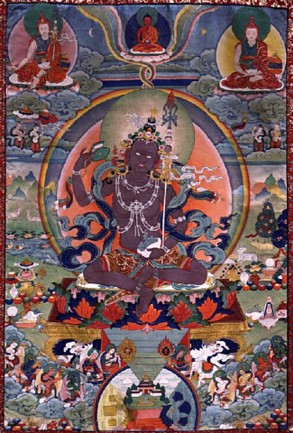Nyingtik Saldrön: Difference between revisions
Jump to navigation
Jump to search
No edit summary |
|||
| Line 7: | Line 7: | ||
:In outer form you are the [[bodhisattva]] Lord Chökyi Lodrö, | :In outer form you are the [[bodhisattva]] Lord Chökyi Lodrö, | ||
:'''nang tar jampal trimé shenyen dang''' | :'''nang tar jampal trimé shenyen shyap'''<ref>There are different versions of this line. Some editions have dang, but according to the Gangtok edition of Jamyang Khyentse's collected works, the line ends in shyap (Wyl. ''zhabs''). [[Alak Zenkar Rinpoche]] has confirmed that this is the correct version.</ref> | ||
:Inwardly, you are [[Manjushri]] and [[Vimalamitra]], | :Inwardly, you are [[Manjushri]] and [[Vimalamitra]], | ||
| Line 28: | Line 28: | ||
*[[Dilgo Khyentse Rinpoche]], ''A Letter of Advice for Practising The Bright Torch of the Innermost Essence''. | *[[Dilgo Khyentse Rinpoche]], ''A Letter of Advice for Practising The Bright Torch of the Innermost Essence''. | ||
==Notes== | |||
<small><references/></small> | |||
Revision as of 16:11, 25 June 2009

Nyingtik Saldrön (Wyl. snying thig gsal sgron) 'The Lamp that Illuminates the Heart Essence' — a guru yoga practice composed by Jamyang Khyentse Chökyi Lodrö at the request of Yudrön, a princess of Derge, and Dilgo Khyentse Rinpoche. Of all the guru yoga practices that he composed, this is considered the most special. Jamyang Khyentse also wrote a commentary to the practice, called the Yeshe Saldrön.
Prayer of Invocation
It contains the following invocation:
- chi tar gyalsé chökyi lodrö jé
- In outer form you are the bodhisattva Lord Chökyi Lodrö,
- nang tar jampal trimé shenyen shyap[1]
- Inwardly, you are Manjushri and Vimalamitra,
- sangwa tsen dzok heruka pal la
- Secretly, you are the Glorious Heruka with perfect attributes,
- solwa depso dak gyü chin gyi lop
- Grant me the blessings to change my mindstream, I pray!
- Mantra for invoking the wisdom mind:
- om ah hung guru shri pema heruka sarwa siddhi pala hung
Commentaries
In Tibetan
- Jamyang Khyentse Chökyi Lodrö, Yeshe Saldrön (Wyl. ye shes gsal sgron), JKCL sungbum vol. II.
- Dilgo Khyentse Rinpoche, bslab grol yon tan dge ba 'jam dbyangs rgyal mtshan la phul ba, Collected Works, vol. 3, pp. 467-470.
In English
- Jamyang Khyentse Chökyi Lodrö, Yeshe Saldrön, 'The Lamp that Illuminates Wisdom'.
- Dilgo Khyentse Rinpoche, A Letter of Advice for Practising The Bright Torch of the Innermost Essence.
Notes
- ↑ There are different versions of this line. Some editions have dang, but according to the Gangtok edition of Jamyang Khyentse's collected works, the line ends in shyap (Wyl. zhabs). Alak Zenkar Rinpoche has confirmed that this is the correct version.